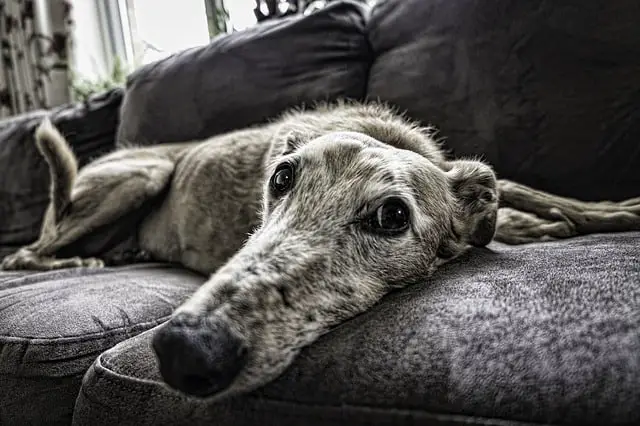
When diarrhea occurs in older dogs, you need to keep in mind that these animals have other nutritional needs than those of younger dogs.
Over the years, the effects of time are also felt on the organism of pets. If you have a dog or cat that has now entered the last phase of its life, you know well that health problems and ailments are the order of the day. Here is a practical guide that will help you solve and treat diarrhea in older dogs .
Many think that this problem is only a temporary discomfort and easy to overcome. But, if not treated effectively, it can lead to dehydration and, in extreme cases, even death, as well as recurring. Better therefore to listen to some useful advice. Let’s see what to do in case of diarrhea in older dogs.
Causes of diarrhea in older dogs
There are two types of diarrhea: acute or chronic. In the first case we are talking about a situation that lasts a few days, sometimes linked to a diet poor in nutrients. Otherwise, the problem can last several weeks, with serious risks to the animal’s well-being.
When diarrhea occurs in older dogs, you need to keep in mind that these animals have other nutritional needs than those of younger dogs . Many times, changing the diet and switching to a better quality type of feed, more adapted to the age of your pet, can solve the problem.
On other occasions, even the slightest change in the diet itself can be the cause of the problem. Remember that any nutritional change must always be done gradually.
In the case of diarrhea in older dogs, it rarely results from viral infections. On the contrary, parasitic ones are more frequent, in general with a much higher incidence than when your pet was a puppy. Keep up to date vaccines, boosters and periodic deworming to eliminate this possibility.
While older dogs are usually no less anxious, it is possible for them to lick or eat anything. Maybe during a hike or walking on the street or in a park. One option to stem the possible causes of the problem is to stop him from drinking from puddles and from sniffing other dogs’ garbage or feces.
Diarrhea in older dogs: when to go to the vet?
On many occasions, it can be interesting to use home remedies that are proven to be effective and safe for pets. However, it is always advisable to contact your veterinarian . Once the diagnosis has been made and more serious problems excluded, the doctor will prescribe the most appropriate treatment to the animal , depending on the case.
If the diarrhea is very liquid or has traces of blood, the advice is to immediately take the animal to the veterinary clinic, without wasting time.
Sometimes diarrhea can be accompanied by vomiting . In this case, prompt veterinarian intervention is important , as well as if he stops eating or has severe pain in the intestines.
Home remedies for diarrhea in older dogs
In the case of mild diarrhea, your dog should drink plenty of water to make up for the fluids he has lost. Additionally, you may need to fast for a day so your stomach can rest. But only if you know he hasn’t ingested anything dangerous.
One of the simplest remedies is the administration of probiotics, which are sold in veterinary clinics. Otherwise, you can try foods such as yogurt or kefir , which contain active ingredients that serve to restore the intestinal flora. The portions must be very minimal.
If the dog does not recover in a few days, the diarrhea may be hiding something more serious. Discard the hypothesis of indigestion or mild intoxication, you will necessarily have to contact your veterinarian. Your four-legged friend’s life could be in danger.
Diarrhea in older dogs can be a symptom of more serious diseases, such as the presence of viruses or bacterial problems ; it could also be alarming about possible cancer . For this reason, it is best not to take diarrhea lightly and keep a close eye on the animal.






